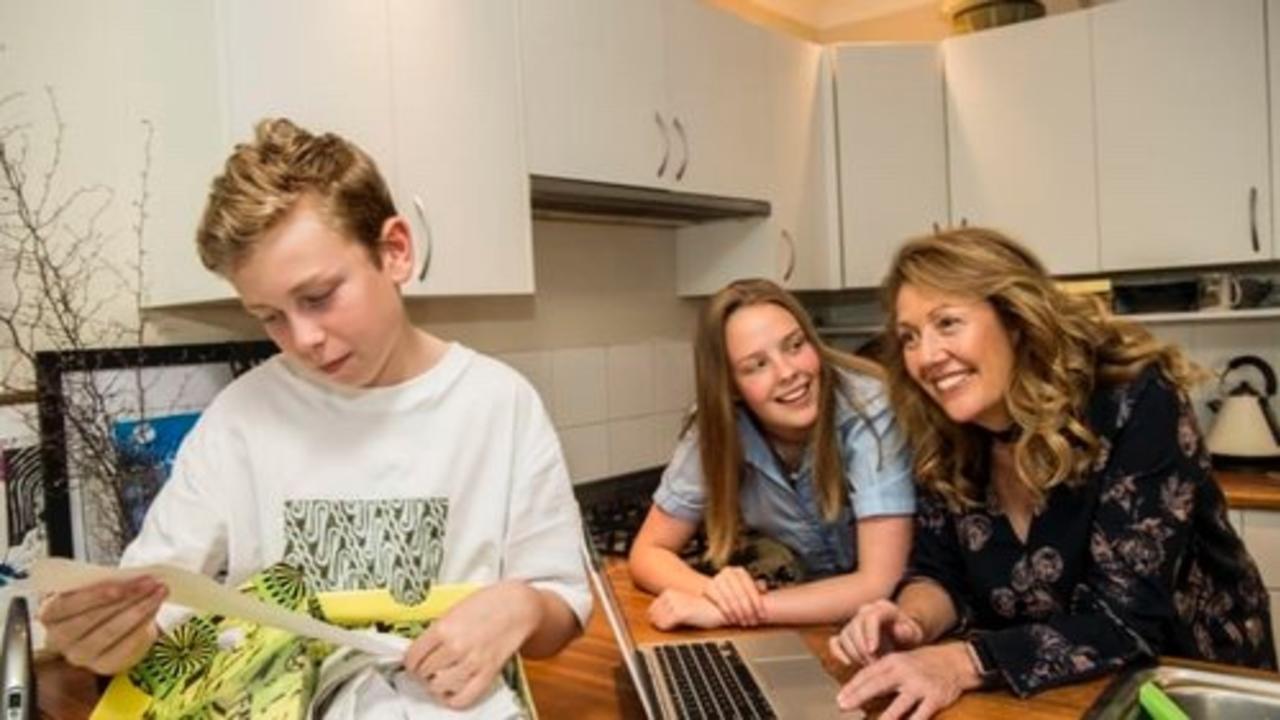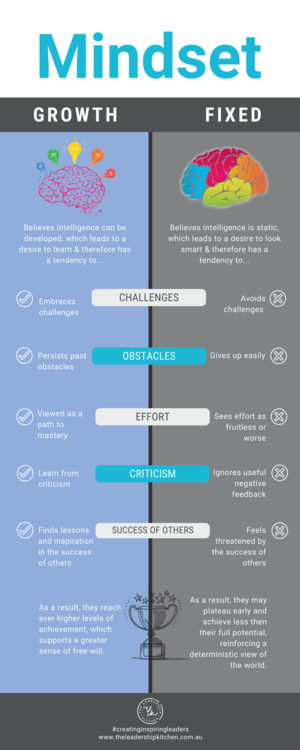Mind Your Attitude - Get A Growth Mindset

Your attitude is the foundation for your success's. From your attitude arises your actions, which in turn generates results. Equally, your attitude is the foundation for your failures. With a negative attitude you've failed before you've even begun.
Where do negative attitudes come from? They are formed through habitual negative thinking. A habit that can be so ingrained that you may not even be aware of it. You may for example, subconsciously expect failure and disappointment, which in turn attracts those results.
Simply put, what you think is what you get. The good news is, you control your attitude and as it turns out, that's just the power you need.
Your set of attitudes, known as a mindset, has the ability to change the course of your life. Those with a 'growth mindset,' believe their current ability and characteristics are merely a starting point for development and their ability to achieve more and overcome deficiencies is not limited. A growth mindset allows people to thrive durin...
The Power Of Positive Thinking

The “power of positive thinking” is a popular phrase but aside from a few moments of good feelings, what do we really gain?
Positive thinking can be defined as positive imagery, positive self-talk or being optimistic and its power lies in the benefits it bestows upon our health, life, work and our future.
We know from esteemed scientific research that positive thinking reduces the chances of developing stress-related disorders and improves our confidence and our mood.
We also know, thanks to groundbreaking findings from Barbara Fredrickson a positive psychology researcher at the University of North Carolina, that the positive emotions associated with positive thinking have the ability to contribute to our future successes.
Termed the "broaden and build" theory, Fredrickson found that experiencing positive emotions enables us to see more possibilities and enhances our ability to develop skills and resources for future use. With a broadened view, we're able to evaluate our past experiences a...
What's Great About A Culture Of Belonging?

What is great about creating a culture of belonging? It's better for everyone and easy to support. We all have a role to play, inclusion can be nurtured peer-to-peer, bottom-up and top-down and everyone benefits. A culture of inclusion is a stronger culture, filled with better performing individuals and teams, healthier work relationships, better engagement and retention. And simply, it's the kind of culture thats great to work in.
Here are five ways to support inclusion:
1. Be Clear
State a commitment to an inclusive culture and reiterate this message organisation-wide, sending a clear message to everyone. Offer details that illustrate what an inclusive culture looks like at your organisation, such as FAQ, the what, who, how and why and also highlight the benefits to all, individuals and teams alike.
2. Value Variety
Foster healthy debate, innovation and acceptance by bringing different people to the table. Change up who runs and attends meetings, making sure to include diverse groups, the...
Leadership Begins Young

Leadership, a word tied to success or failure. When you think of leadership, you're probably thinking of the adult experience of leadership; team leaders, department heads, senior management. But this important life skill begins to develop in childhood.
Our understanding of leadership in children and adolescents is still forming. In the last 10–20 years youth targeted leadership development programs has spotlighted the need to focus on leadership skills in young people. But if you haven't participated in one of these programs, like the majority of individuals, your first formal experience of leadership practice is in school.
Do you remember being the sports monitor for the day? Or perhaps you were a school prefect or captain? The difficulty with leadership within the school system is that it is not easy nor always possible to create opportunities for every young person to practice leadership skills and so, the chance to lead can only be extended to one person at a time. Many of us wi...
11 Ways To Be A Better Listener

Listening is a bit like intelligence— people like to think their listening skills are above average, but on closer reflection they could admit to committing common listening mistakes.
With so much of work revolving around communication, such as giving and receiving feedback and instructions, discussing project and deadlines, the need to listen well is clear.
Failing to keep your ears (and eyes) open could set you back in your career. A recent study conducted at George Washington University showed that listening can influence up to 40% of a leader’s job performance.
In today's fast paced environment, pausing to truly listening to others can feel like a drain on our time. But active, effective listening is crucial to our job performance and is key to reducing miscommunication and conflict in the workplace. With a conscious effort we can enhance our listening skills.
Here's how:
-
Defer judgement - really concentrate on listening when the other person begins to say something that you don’t
...
Dealing With Someone Difficult? HUG Them!
Do you ever find that some people are hard to get along with? Try using the H.U.G strategy. There are three steps, each can be applied simply and immediately.
1. Hear them: Use your great listening skills and then ask, “Here’s what I heard you say. Is this what you meant?” When people know that they’ve been heard, they become more open, which can lead to a shift in their behaviour.
2. Understand them: Understanding someone is not necessarily the same as agreeing with them. But letting someone know, “I understand where you’re coming from” shows that person that you are aware there may be unspoken values or emotions driving what they are saying.
3. Guide them: Sometimes difficult people can project what is happening within themselves onto you. An effective way of maintaining respect yourself and the other person in this situation is by guiding them in how they talk to you and engage with you.
Got A Creative Block?

Too much on your mind? Try this technique to release your mind.
Anyone who has sat down to concentrate only to feel their mind pulled in a million different directions knows the power of processing less in order to create more.
In today's busy world, reducing our cognitive load is a technique that can be employed to enhance our creative flow. Researchers from Bar-Ilan University’s Brain Research Centre found that individuals were more creative when they have less on their minds in comparison to individuals who had a lot to think about. A clearer mind equalled more creativity.
How do we reduce the strain on our minds? By using Cognitive Pause and Unload. CPU, a term coined by University of Florida’s Dr. Deshmukh, is a technique that frees attentional space for greater creativity.
Essentially, it is a form of meditation. But rather than an 'empty your mind' type of mediation, CPU is a technique used to 'focus your mind' intensely on the present. The benefits of focusing on the present come ...
Are You Really Listening?

"Seek First to Understand, Then to be Understood" - Dr. Stephen Covey
Are you someone who finds themselves distracted while listening to others speak? Your eyes shoot a quick glance at your phone, your mind wanders off, or perhaps you're busy forming an opinion and your judgement prevents you from truly understanding what that person is saying.
According to Dr. Stephen Covey, learning to communicate effectively is the most important life skill. But for many of us, our ability to listen is clouded by an 'autobiographical' filter. When you listen 'autobiographically' what you hear is automatically filtered through and measured against your life experiences this leaves you more likely to respond in one of four ways:
Evaluating: you judge and with agree or disagree
Probing: you ask questions from your own frame of reference
Advising: you give counsel, advice and solutions to problems
Interpreting: you analyse others' motives and behaviours based on your own experiences
You may wond...
Four Ways To Build An Innovative Team

The way to build an innovative team might be right at your fingertips. According to Harvard Business Review, focusing on these four areas can help to build an innovative team:
Hiring people who share your Mission
Placing a high value on teamwork
Nurturing an environment of psychological safety
Creating Diversity
The notion that innovation is only about ideas needs to be dispelled. It's not only about ideas, it’s also about solving problems. While the tendency to hire people with a certain "type" in mind is common, it is better to hire people who want to tackle the problems that your organisation needs solving. For these people, who share your mission and have an intrinsic motivation, creativity runs high.
Even more valuable than having the "best" people, is having the best teams. With complex problems to solve, teamwork is key. The best teams include people who truly tune in to those around them, they are generous, strong collaborators. These particular attributes research show are a competi...

